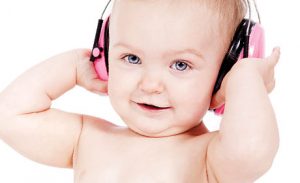The sounds of summer may be dying down, but there’s still plenty of noise about from lawn mowers to summer concerts to construction sites and more. Prolonged exposure to these types of sounds can lead to noise-induced hearing loss for babies.
Sound is measured in decibels (dB). Normal conversation is typically around 60 dB. Regular exposure to noise higher than 85 dB can cause hearing loss. Considering an average rock concert blasts sound between 100 – 120 dB, you might want to think twice before taking Baby along to that next show … or at least make sure you’re protecting his ears.
BABIES & NOISE
“It’s pretty well known that babies and young children are more sensitive to noise,” says Maggie Kettler, Au.D., Clinical manager division of Audiology at Cincinnati Children’s Hospital Medical Center. “While the range of hearing is the same for adults and children, children often process loud sounds differently than adults. It’s not uncommon to see children startle or cry because of environmental noises.”
Babies are more sensitive to sound than adults, so how loud is too loud for them? “We consider noise above 85 dB to be too loud,” says Kettler. “That is the noise level of a passing diesel truck or an alarm clock. A more practical way to look at it is, you should be able to talk over the noise level without raising your voice.”
“We live in a noisy world and sometimes noise exposure can’t be avoided,” continues Kettler. “For these environments, it’s recommended that children wear hearing protection (i.e., headphones): music concerts, fireworks, construction areas, sporting events, car races. These environments are too loud for babies, young children and often adults, too.”
While short-term effects of loud noises are usually tinnitus (ringing in the ear) or a temporary shift in the sound threshold, longer exposure can cause permanent problems. “Noise can damage the ears and cause a hearing loss in infants and children,” says Kettler. “Sudden, extremely loud sounds or extended exposure to loud sounds can cause hearing loss.”
What about in utero?
“Luckily, babies in utero are somewhat protected from sounds due to their surroundings,” says
Kettler. “Pregnant women should avoid extremely loud environments over 150 dB (a jet engine) or extended periods exposed to sounds over 115 dB (loud construction or chain saw).”
PRODUCTS TO HELP
Many protective earplugs and noise-cancelling headphones are on the market for infants. Get a set. While the complete avoidance of loud environments for babies is your safest bet, the real world is full of loud noises so you’ll want to be sure Baby’s covered. And, if you have concerns about your baby’s hearing, consult your pediatrician.
BABY HEADPHONES
NRR = Noise Reduction Rate
Baby Banz Ear Protector Muffs
31 dB NRR
Ages 0 – 2
$30 at banzworld.com
BEBE Muff Hearing Protection
25 dB NRR
Ages 3 – 24 months
$34.97 at bebe.com
EM’S 4 Bubs
22 dB NRR
Ages 0 – 18 months
$30.99 at earmuffsforkids.com
Snug Kid Ear Defenders
30 dB NRR
Ages 6 months+
$16.95 at snugtogether.com
Source: soundproofingtips.com





